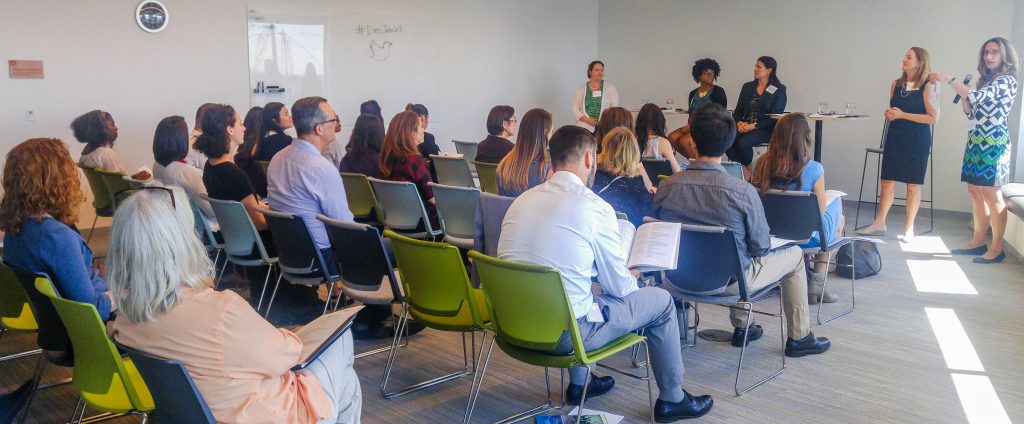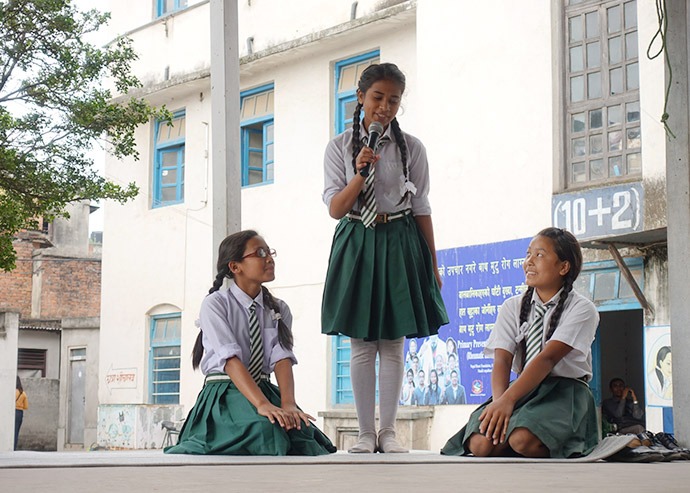Posted on July 21, 2017
By Riya Mehta, Stanford in Government Fellow at Landesa

Panel on Careers in International Development (Photo: Colleen O’Holleran / Landesa)
On June 19, 2017, Global Washington partnered with Landesa to lead a panel discussion on careers in international development for the third year in a row. The event provided an opportunity for students and experienced professionals alike to learn more about Washington’s international development community and the best ways to navigate the international non-profit sector.
The event was moderated by Melissa Merritt, Vice President of Executive Search practice at Waldron, a Seattle-based consulting organization. Panelists included Jodi-Ann Burey, Andie Long, and Heidi Peterson, three professionals who all work for Seattle-based international development organizations. Burey is a Health Systems Associate at VillageReach; Peterson is the Executive Director at Mobility Outreach International; and Long currently serves as the Director of Marketing and Communications for Global Washington.
Continue Reading
Posted on July 17, 2017
By Aimee Khuu, Senior Director for International Programs, Providence Health & Services
Over the past three years, Providence St. Joseph Health (PSJH) Global Partnerships and Medical Teams International have set out to improve health outcomes in Chicaman, El Quiche—a rural municipality in the highlands of Guatemala. We are continuing international outreach efforts started by the Sisters of Providence 160 years ago when they journeyed to Vancouver, Washington from Montreal.
Continue Reading
Posted on June 29, 2017
By Sandy Clark and Cyndie Berg
When Global Washington NGOs come together, sparks fly, so it’s no surprise that a partnership between Splash and Days for Girls (DfG) would create fireworks. Combining forces to improve health awareness and conditions for kids – we have leveraged our collective strengths to double our impact, reaching thousands of youth in schools.
Starting in Nepal, where Splash and DfG already have established programs, we set out to raise awareness of menstrual hygiene management (MHM) in 28 Splash schools through education, while creating sustainable access to environmentally friendly and cost-effective DfG female hygiene products.

Female student leaders give speeches to their classmates about hygiene education at Adarsha Kanya School in Lalitpur District, Nepal, on Menstrual Hygiene Day, May 28, 2017. (Credit: Splash)
Together, for Menstrual Hygiene Day on May 28th, we reached over 10,000 girls and boys in Kathmandu, Nepal. Our teams recruited and trained 50 teachers and volunteers to fight stigmas, break barriers, and increase knowledge on menstruation. To make sure it was truly a celebration, our local teams worked with students and teachers to develop games, plays, and other creative activities. The school-wide events engaged students in a lively discussion aimed at reducing the stigma about periods.
Continue Reading

